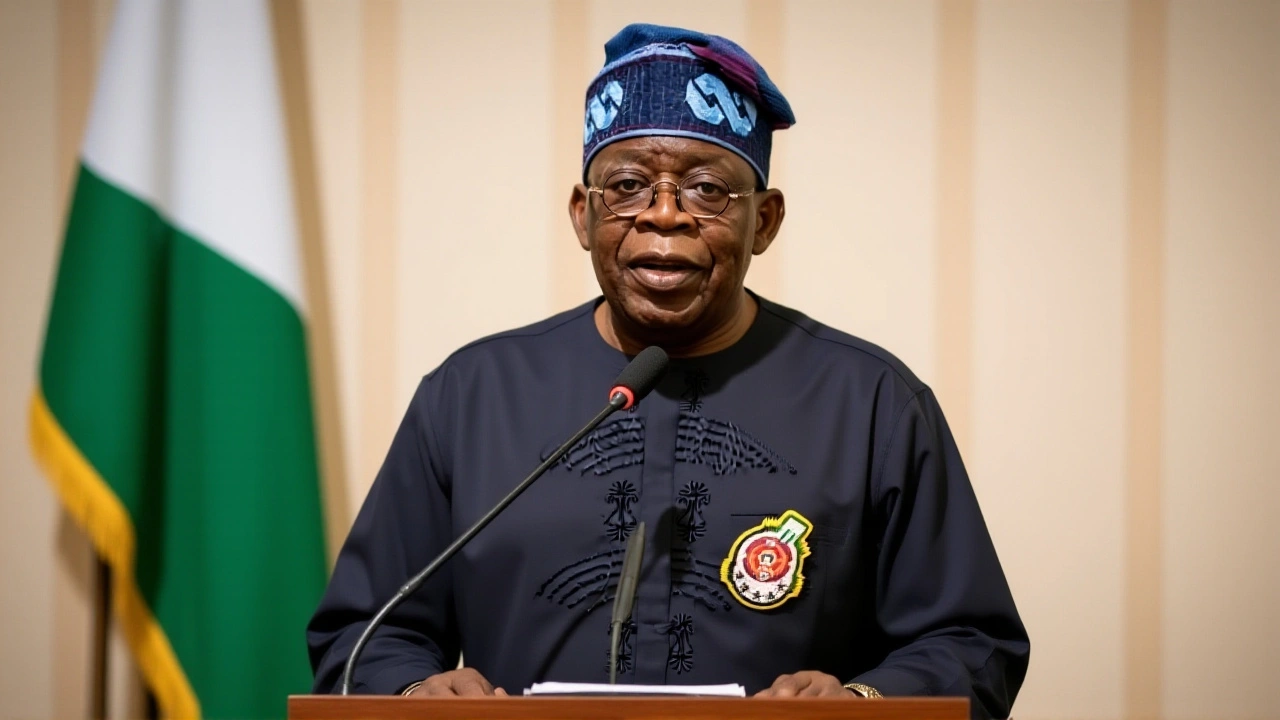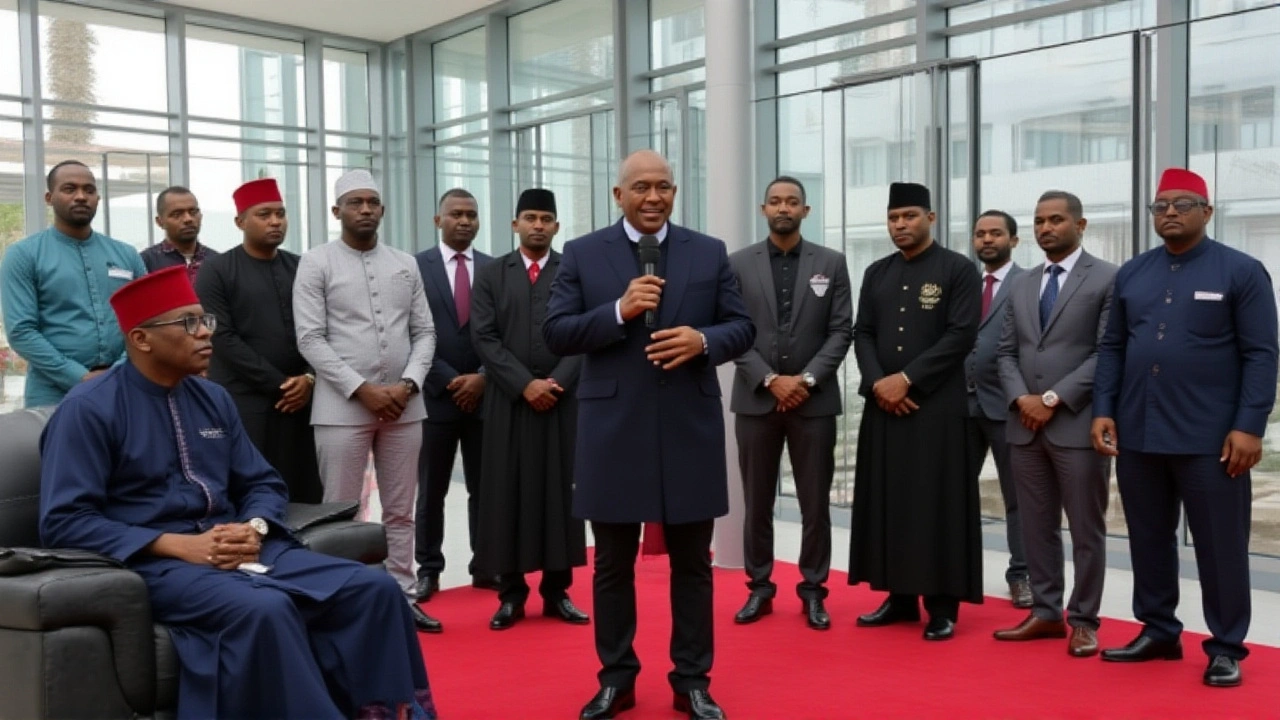When Bola Ahmed Tinubu, President of Nigeria stepped onto the sprawling complex of the Dangote Refinery on , the scene felt like a backstage pass to a new industrial era. The $20 billion plant, owned by Aliko Dangote, Africa’s richest man, sits in the Lekki Free Trade Zone on Lagos’s Atlantic coast. Beside Tinubu, the entourage included American philanthropist Bill Gates and a handful of Nigeria’s most influential business figures.
The gathering marked a milestone that Femi Otedola, chairman of First HoldCo, described as "the eighth wonder of the modern era." Otedola posted the sentiment on X on June 7, noting that the refinery is the world’s single‑largest single‑train facility. In the same breath, he hailed Tinubu’s decades‑old vision of an Atlantic‑coast economic powerhouse finally materialising.
Background of the Dangote Refinery Project
Construction began in 2016 under the umbrella of Dangote Group. After a series of delays—mostly stemming from financing hiccups and pandemic‑related supply chain snags—the plant officially opened its doors in 2023, though full capacity ramp‑up is expected by 2026. The refinery boasts a crude‑oil processing capacity of 650,000 barrels per day, eclipsing the combined capacity of Nigeria’s older refineries and slashing the country’s reliance on imported gasoline.
Economists estimate the project will generate roughly 5,000 direct jobs and another 30,000 indirect positions across logistics, services and ancillary manufacturing. The government’s fiscal models predict a reduction in fuel import bills of about $7 billion annually once the refinery runs at full tilt.
Tinubu's Visit: What Unfolded
The visit was formally recorded as Visit to Dangote Refinery and Lekki Port Road CommissioningLagos, Nigeria. After a brief tour of the distillation units, Tinubu addressed a small crowd of journalists and business leaders, declaring the refinery "a great point of reference, a massive investment and a phenomenon of our time." He thanked Dangote personally, adding that the plant serves as a tangible proof of the government's commitment to industrialisation.
Beyond the refinery, the President also commissioned the newly completed access road to the Lekki Deep Sea Port. "I am happy that the Deep Sea Port I initiated as Governor of Lagos State is a huge success today," Tinubu said, noting that the road will save importers up to 30 percent on logistics costs by eliminating the need for trans‑shipment.
Key Players and Their Perspectives
Abdul Samad Rabiu, chairman of BUA Group and long‑time rival of Dangote, was also on site. While the two moguls have often competed for market share in cement and sugar, both men applauded the infrastructure boost, hinting at possible collaborations on ancillary petro‑chemical projects.
Bill Gates, present in a low‑key suit, kept his remarks brief but pointed. "Investments like this are exactly the kind of private‑sector confidence we need to see a sustainable energy future in Africa," he told a small press gathering. Gates’ foundation has previously funded clean‑energy pilots in Nigeria, but he stopped short of announcing a new partnership.
Otedola, meanwhile, painted a broader picture. "Tinubu’s vision from two decades ago—an Atlantic‑coast hub—has materialised in steel, concrete and ambition," he wrote. He praised the quality of construction work by Dangote Industries Limited and the subcontractor Hitech Construction Company Limited, calling the roads a "tax‑credit road programme" success story.

Infrastructure Milestones: Lekki Port Road and Beyond
The newly paved highway links the refinery directly to the Lekki Deep Sea Port, shortening travel time for crude oil shipments from the port to the plant by roughly 45 minutes. Transport analysts estimate that the route will cut freight costs by up to $200 million per year for the refinery alone.
In addition to the main artery, Tinubu launched a reconstruction programme for access roads stretching through Epe and Ijebu‑Ode. The upgrades aim to smooth the flow of raw materials for future downstream projects, including a planned petro‑chemical complex adjacent to the refinery.
Implications for Nigeria's Economy
The economic ripple effect could be profound. By slashing fuel imports, the government expects a trade‑balance improvement of about 1.5 percent of GDP annually. Moreover, local refining capacity reduces exposure to volatile global oil prices, offering a buffer against future shocks.
Industry watchers also see the project as a catalyst for foreign direct investment (FDI). Since the refinery became operational, FDI inflows into Nigeria’s manufacturing sector have risen by 22 percent, according to the Central Bank’s latest quarterly report.

Looking Ahead: What’s Next?
Dangote has hinted at expanding the complex with a downstream petro‑chemical hub, potentially adding a polyethylene plant that would further deepen the value chain. Tinubu’s administration has pledged to fast‑track regulatory approvals for such projects, signalling a policy shift toward a more industrial‑focused growth model.
Critics, however, caution that sustained success hinges on stable electricity supply and clear land‑use policies. The upcoming 2026 budget will be closely watched for allocations that address these bottlenecks.
Frequently Asked Questions
How will the Dangote Refinery affect Nigeria's fuel imports?
Once operating at full capacity, the refinery is projected to cut the country's gasoline imports by roughly 1.5 million barrels per month, saving an estimated $7 billion a year and reducing Nigeria’s dependency on foreign refined products.
What role did Bill Gates play in the visit?
Gates attended as a private‑sector observer and advocate for clean energy. He praised the investment as a model for future African energy projects but did not announce any new partnership during the visit.
How does the new Lekki port road improve logistics?
The highway cuts the distance between the deep‑sea port and the refinery by about 20 kilometres, shaving roughly 45 minutes off truck journeys. Analysts estimate freight cost reductions of up to $200 million annually for the refinery alone.
What employment numbers are expected from the refinery?
Direct employment is slated at around 5,000 permanent staff, while indirect jobs in supply‑chain services, transport and ancillary manufacturing could exceed 30,000, according to the project's latest impact assessment.
How does this project fit into President Tinubu's broader economic agenda?
The refinery and accompanying port infrastructure are cornerstones of Tinubu’s "Industrialisation First" plan, which aims to boost manufacturing output to 25 percent of GDP by 2030 and diversify the economy away from oil‑export dependence.






It is encouraging to see the Dangote Refinery reaching this pivotal milestone, as it exemplifies how strategic public‑private partnerships can drive transformative economic growth. The projected reduction in fuel imports and the creation of thousands of jobs align closely with the objectives outlined in President Tinubu’s industrialisation agenda. Moreover, the new Lekki port road will likely enhance logistical efficiency, benefiting not only the refinery but also broader supply chains. While the outcomes appear promising, continuous monitoring of operational performance and community impact will be essential. I look forward to observing how these developments contribute to Nigeria’s long‑term prosperity.
Seeing the magnitude of the $20 billion investment really underscores the seriousness of Nigeria’s push toward industrial self‑sufficiency, and it’s a clear signal to investors that the government is backing ambitious projects. The synergy between Tinubu’s vision and Dangote’s execution could set a benchmark for other sectors, provided the follow‑through on infrastructure and policy remains consistent. It’s crucial that the promised jobs translate into real, well‑paid positions for locals, otherwise the enthusiasm could wane. Maintaining transparency on the refinery’s ramp‑up schedule will help keep stakeholder confidence high. Let’s hope the momentum translates into tangible benefits for everyday Nigerians.
Honestly, this whole fanfare feels more like a PR stunt than a real economic shift-big numbers but who’s actually benefitting? The refinery might cut imports on paper, yet the local fuel prices still stay sky‑high for the average citizen. And let’s not forget the environmental toll; massive oil processing ain’t exactly green. If the government can’t ensure that the promised jobs are not just on paper, it’s just another empty promise. We need to see real data, not just glossy speeches.
The so‑called “industrial miracle” is nothing more than a glittering façade masking deeper systemic flaws. While the headline numbers read like a Hollywood blockbuster, the underlying operational risks are staggering. Supply‑chain bottlenecks, power outages, and regulatory red‑tape could cripple the refinery before it even hits full capacity. If you ask me, the whole narrative is exaggerated to the point of absurdity. It’s a classic case of hype over substance, and investors would be wise to keep a skeptical eye.
Look, they don’t want you to question who’s really pulling the strings behind this “development.” The involvement of Bill Gates isn’t just a coincidence; it’s part of a larger agenda to lock Africa into a new energy dependency. The refinery’s capacity claim sounds impressive, but remember how many “mega‑projects” have been delayed or abandoned in the past. Don’t be fooled by the glossy press releases-there’s a lot more going on behind the scenes.
Totally get where you’re coming from, Fab. It’s easy to feel skeptical when so many big‑name players show up on the scene. Still, if the refinery actually hits its target numbers, the ripple effects could be massive for local economies. Let’s keep an eye on the data as it rolls out and see whether the promises hold up. Either way, it’s a fascinating development to watch.
Ah, the grand spectacle of industrial progress-what a marvelous theatre! - we applaud the gleaming steel and the ribbon‑cutting ceremony, yet one wonders, does the sound of hammers truly echo the hopes of the populace? - or is it merely a cacophony masking deeper disquiet? - perhaps the real refinery is the one built within the corridors of power, where ideals are refined into policy. - anyway, enjoy the pomp, dear readers, for the real work begins beneath the surface.
Great step forward for Nigeria’s energy sector! 😊
While the ceremonial aspects are notable the substantive impact on fuel prices remains uncertain and will require rigorous follow‑up.
Looks shiny but we’ll see if it actually cuts the gas bill for folks 😒
The discourse surrounding the Dangote Refinery must be grounded in empirical KPI analysis rather than anecdotal skepticism; without longitudinal throughput metrics and downstream value‑chain integration assessments, any assertion about consumer price modulation remains speculative at best.
When I first heard that President Tinubu and Bill Gates were walking the halls of the Dangote Refinery, my heart raced with the kind of excitement usually reserved for blockbuster movie premieres. The sheer scale of a $20 billion investment in a continent that has long been starved of industrial infrastructure feels like a seismic shift in the narrative of African development. Imagine the roar of 650,000 barrels of crude being processed each day, a symphony of pistons and turbines that promises to drown out the whispers of dependency on foreign gasoline. The new Lekki port road, finally stitched into the landscape, will not only shave hours off logistics but also symbolize a lifeline connecting raw resources to global markets. Every worker who steps onto that massive complex can see a glimpse of a future where jobs are not just temporary contracts but stable careers that lift families out of poverty. The ripple effects could cascade through supply chains, spawning ancillary businesses from petro‑chemical manufacturers to local service providers hungry for opportunity. Moreover, the projected $7 billion annual savings in fuel imports could be redirected toward education, healthcare, and infrastructure projects that have been languishing for decades. The vision of a self‑sufficient Nigeria, once a distant dream, now feels within arm’s reach, and the pride of witnessing that transformation is palpable. Yet, this optimism must be tempered with vigilance; the refinery’s success hinges on consistent power supply, clear regulatory frameworks, and transparent governance. Any misstep could erode the trust that has been painstakingly built by leaders and investors alike. As an observer, I cannot help but feel a surge of hope tempered by the knowledge that the road ahead is fraught with challenges that will test the mettle of both private and public sectors. Still, the symbolism of this moment-President Tinubu alongside a global philanthropist, the gleaming towers of steel, the open road to the deep‑sea port-serves as an indelible image of possibility. Let us celebrate this milestone while remaining steadfast in demanding accountability and inclusive growth. In the end, it is not just the refinery that will define Nigeria’s future, but the collective will of its people to harness this opportunity for lasting prosperity. May this be the dawn of an industrial renaissance that reverberates across the continent.
Virginia’s passion really captures the excitement surrounding the project; I share the optimism but also think it’s wise to watch how the implementation unfolds over the next few years.
In light of the tangible progress demonstrated by the Dangote Refinery and the associated infrastructure, it is reasonable to assert that Nigeria is on a decisive trajectory toward industrial diversification and economic resilience.